Celebrating Vanuatu Independence Day

Vanuatu Independence Day stands as a testament to the resilience and spirit of a nation that fought for its autonomy against colonial powers. Celebrated annually on July 30th, it marks the historic moment when Vanuatu broke free from the shackles of British and French colonial rule in 1980. In this comprehensive guide, we delve into the rich history, significance, and ways to commemorate this important day.
History of Vanuatu Independence Day
The archipelago now known as Vanuatu was first encountered by British explorer Captain James Cook in 1774, who christened it the ‘New Hebrides’. This encounter marked the beginning of European influence in the region, characterized by missionary activities and the introduction of cash crops like cotton, coffee, and cocoa. In 1906, the British and French governments established the Anglo-French Condominium to jointly administer the islands. This unique arrangement led to a complex governance structure, where two colonial powers coexisted, often at the expense of the native population. Despite efforts for self-determination, including movements in the 1970s, true independence remained elusive. The path to independence was paved with resilience and determination. Led by figures like Prime Minister Walter Lini, the people of Vanuatu mobilized for change. After years of negotiation and political maneuvering, independence was finally achieved on July 30, 1980. The Republic of Vanuatu emerged as a sovereign nation, free to chart its own course.
Timeline for Vanuatu’s Independence Journey
1100 B.C — 700 B.C: The Settlers Arrive
The Lapita culture establishes settlements in the Vanuatu islands, laying the foundation for indigenous society.
1774: Vanuatu Islands are Named
Captain James Cook explores the islands, giving them the name ‘New Hebrides’ and initiating European contact.
1980: Vanuatu Becomes Independent
New Hebrides sheds its colonial past, gaining independence from Britain and France to become the Republic of Vanuatu.
2008: UNESCO Recognized Lapita Sites
Vanuatu’s cultural heritage is recognized on the world stage as Lapita sites are designated UNESCO World Heritage Sites.
Significance of Vanuatu Independence Day
The official languages of Vanuatu reflect its diverse cultural landscape, with Bislama, English, and French being widely spoken. At the helm of the nation, President Tallis Obed Moses and Prime Minister Bob Loughman lead with a vision for progress and unity. The people of Vanuatu, known as ‘Ni-Vanuatu’ or ‘Vanuatuan’, take pride in their cultural identity and heritage. Celebrating independence is not just about political autonomy but also about preserving and honoring centuries-old traditions. Independence Day is more than just a date on the calendar; it symbolizes the triumph of self-determination and the right of every nation to govern itself. By commemorating Independence Day, the people of Vanuatu honor the sacrifices of their forebears and draw inspiration from their struggles and triumphs. The heroes of Vanuatu’s independence movement, often unsung, are remembered and revered on this auspicious day. Their courage and conviction laid the foundation for a free and prosperous nation.
Commemorating Independence Day
Show solidarity with the people of Vanuatu by proudly displaying their national flag. Share images on social media platforms, spreading awareness and goodwill. Take this opportunity to delve into the vibrant culture of Vanuatu. From traditional dances to culinary delights, there’s much to discover and appreciate. Expand your linguistic horizons by learning a new term in Bislama or one of Vanuatu’s indigenous languages. Embracing diversity fosters understanding and respect.
5 Fascinating Facts About Vanuatu
- A Hidden Gem: Vanuatu remains one of the least-visited countries globally, offering intrepid travelers a unique and untouched paradise.
- The Majesty of Mount Yasur: Located in Vanuatu, Mount Yasur is hailed as the world’s most accessible active volcano, drawing adventurers and nature enthusiasts alike.
- Joyful Hearts: Despite challenges, Vanuatu consistently ranks among the world’s happiest countries, a testament to the resilience and positivity of its people.
- Linguistic Diversity: With over a hundred languages spoken, Vanuatu boasts a rich tapestry of linguistic diversity, reflecting its multicultural society.
- The Prince Philip Movement: A curious facet of Vanuatu’s cultural landscape, the Prince Philip Movement venerates the Duke of Edinburgh as a divine figure, showcasing the intricacies of indigenous belief systems.
Vanuatu Independence Day Calendar
| Year | Date | Day |
| 2024 | July 30 | Tuesday |
| 2025 | July 30 | Wednesday |
| 2026 | July 30 | Thursday |
| 2027 | July 30 | Friday |
| 2028 | July 30 | Sunday |
Vanuatu Independence Day encapsulates the spirit of freedom and resilience that defines the nation. As we commemorate this historic occasion, let us honor the past, celebrate the present, and envision a future guided by unity, prosperity, and peace. Remember, celebrating Vanuatu Independence Day is not just a gesture; it’s a reaffirmation of the values that unite us as global citizens. As we stand in solidarity with the people of Vanuatu, may we be inspired to uphold the principles of freedom, equality, and justice for all.
Observer Voice is the one stop site for National, International news, Sports, Editor’s Choice, Art/culture contents, Quotes and much more. We also cover historical contents. Historical contents includes World History, Indian History, and what happened today. The website also covers Entertainment across the India and World.

